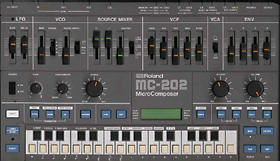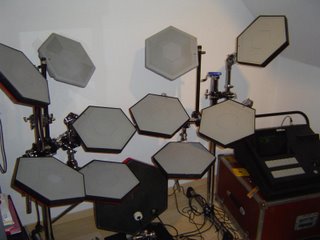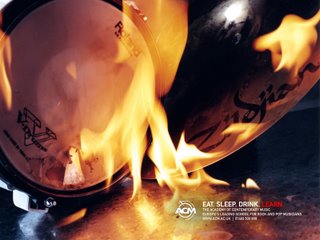
This thing only dawned on me in late 2005, when I had the misfortune of sampling an electric kit for the first time. I’d just joined a new church and their main building at the time was a proper old church affair – high ceiling, pews, high stage surrounded by a wooden fence thing to stop the vicar from falling off during a particularly boring sermon, that sort of stuff. The result of this was a beautiful place to worship but a modern sound man's worst nightmare, I assume because most old-skool church buildings were designed to naturally amplify an organ and nothing else. In the age of the rock and roll worship team, however, this just won’t do.
So some bright spark obviously thought, ‘oh, well drums are really loud, aren’t they, so we’ll get an electric kit in because you can turn those down, right.’ And I can appreciate, even agree with, that logic, but unfortunately I’m now the sad soul who has to use it every week. How I wish that spark hadn’t been quite so bright. (That building is now our amazing 24 hour House of Prayer, but we still have a great worship meeting there every Sunday. Please don't hear anything I'm not saying within this rant - I absolutely love the church and the worship.)
I remember trying the kit for the first time, and it was a bit like test driving a new Daewoo; the very fact you’re trying something new is initially quite exciting, but you know it’ll wear very thin very quickly. I sat behind it and hit one of the pads…
‘Aaah, that sounds quite realistic’, I thought to myself as I registered the weird sensation of sensation of hitting rubber and mesh instead of metal and plastic. I think I must have been expecting it to sound like the drums on those keyboards from the 80s with 15 keys and a built in ‘backing’ function. Then, after about ten seconds, the novelty very definitely wore off.

I’ve thought about this, and I reckon playing an electric kit is equivalent to playing a guitar made out of a cereal box with a drainpipe for a neck and elastic bands for strings, but which makes a sound like a guitar when you play it through an amp. Every ounce of feeling is taken away from you completely, and no matter what anybody says, they sound nothing like a real kit. Well, that’s not quite true, but any drummer would hear the difference no problem.
But because most people aren’t drummers, the real issue is the feeling thing. Every drummer, no matter how good or bad, is separated by their ‘voice’. A drummer’s voice is made up of things like how hard they hit the hi-hat relative to the snare, the type of grooves they play, the way their timing feels, the way they hit the cymbals and how often they play fills, stuff like that. No two drummers will sound exactly the same - they might sound a lot like someone, but their voice will always be slightly different. However, every nuance of that voice is stripped away entirely by an electric kit, mostly because they only have a few sensitivity settings. Three, in fact: quiet, loud and inappropriate.
No matter how advanced they’ve become since the days of a few hexagonal pads on a metal frame, drums are absolutely not suited to electrolysation, which is my new word for making something electric. Particular to worship music, although most other types too, sensitivity is the most important thing to have, apart from Happy Hardcore. The most important thing there is speed.
When you’re ushering in the presence of The Living God, subtlety and sensitivity are needed all the time. If you’re really worshiping and the music’s kicking it’s ok to wack the drums as hard as you can, and I love that, but then when the music’s just a background thing and God is moving, you need something different, something appropriately restrained.

However, there’s a big difference to playing something in a restrained and sensitive way and just playing quiet. This is the fundamental difference - when you hit an electric pad softly, it still makes the huge great ‘wack’ or ‘thump’ sound covered in swathes of reverb, only it does so with a few less decibels. It sucks. At the other end of the spectrum, the maximum level of sensitivity can be achieved by hitting the pads with a quite average level of force, after which there’s nowhere to go. That too sucks. If only they went to 11 like The Tap’s Marshalls, now that would be sweet. It's one louder.
The inappropriate level is again to do with sensitivity and loss of ‘voice’. In worship, there are times when a drummer is no longer just keeping a beat for a song, but adding effects. By this I mean hitting a ride cymbal to emphasise chord changes, or using a soft mallet on a crash for a nice build up, for example. Much like the snare, though, gently hit the ‘crash cymbal’ on an electric kit and all you’ll get is a big reverberant piercing “ppppssssshhhhhhh” sound, only a bit quieter.
What I’m saying is that you’re basically limited to two types of beat; loud and quiet. This is the very basic function of a drummer, to play a steady beat an appropriate level, and that’s all an electric kit will let you do, full stop. It’s like playing a football game on your PlayStation that’ll only let you pass and shoot.
Finally, there’s the pain. Not content with causing consistent mental anguish and frustration, my friend Roland obviously hates me enough to cause me physical pain too. This is a three-fold problem which I’ll explain briefly:
Firstly, the kit is set up on a rack in such a way as to only allow comfortable play for some kind of drumming midget. The hi-hat pad, for example, sits a maximum of about six inches above the snare, so you have to kind of twist your arms a funny way to avoid bashing your sticks together like some sort of amateur giant. Once you've hit it a couple of times it moves anyway, until coming to rest on top of the snare. Great.
Secondly, a couple of the pads have dead spots so you have to hit them in an awkward place, meaning further contortion of the body. And the level of frustration it brings when you hit a crash at the end of the big fill and hear nothing makes me want to pick it up and throw it at someone, usually the keyboard player, who seems to delight in my hatred of the thing. (I don't really want to throw it at him, I’m just making a point.)
And thirdly, there’s no give in the pads at all so hitting them is akin to using a hammer constantly for however long you’re playing, which wrecks after a while. When you hit a relatively thin metal cymbal it moves, cushioning the blow, but hammering a thick static rubber pad for an hour is a different and far more painful story.
Then there was the morning I woke up and thought my ears were bleeding after using it one night. It must be the frequency of the sounds or something, but now I can't bring myself to wear the in-ear monitors, so I can never hear anything other than the thump of a wooden stick hitting a rubber pad.
So, in conclusion, I’d like to take that electric kit and torch it. What I’ll actually do, however, is keep praying to God when I sit behind it that I won’t be distracted in worship by frustration, because the kit’s going nowhere.
I wouldn’t mind one myself to practice with too.

No comments:
Post a Comment